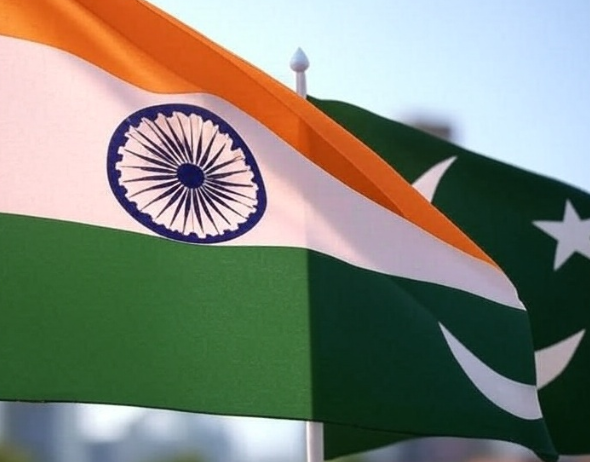
In a startling and revealing interview, Pakistan's Defence Minister Khawaja Asif has openly admitted to a deepening espionage partnership between Pakistan and China targeting India. This isn't just an offhand statement; it marks a significant disclosure of a collaborative intelligence-sharing framework that has serious implications for regional security. The comments come in the aftermath of India’s decisive military response through Operation Sindoor — a campaign that has not only jolted Pakistan but also exposed the strategic vulnerability of the China-Pakistan alliance.
Khawaja Asif’s acceptance on record is more than just political rhetoric; it is a window into the panic-stricken corridors of Islamabad’s power structure. In an interview with Arab News, Asif said, “It is quite normal for friendly countries to share intelligence. China has its disputes with India too, and thus it supports us.” This isn’t just about friendly cooperation — it’s a blatant acknowledgment that China is providing satellite data, real-time surveillance, and signal intercepts to Pakistan in a bid to monitor Indian movements.
This cooperation is not surprising to geopolitical observers, but hearing it from Pakistan’s own Defence Minister solidifies long-standing suspicions of a joint surveillance operation against India. China, true to its ‘divide and dominate’ strategy, seems to have converted Pakistan into a willing pawn in its regional chessboard. The real-time intelligence China shares with Pakistan acts as a second set of eyes for Islamabad — a position once held solely by Pakistan’s ISI is now seemingly handed over to Beijing’s satellite network.
The timing of this confession also points towards a larger geopolitical reaction to India’s growing assertiveness. Operation Sindoor, carried out by India, was a calculated and effective military response to repeated cross-border attacks and terror infiltrations. Indian forces targeted terrorist hideouts across the LoC with surgical precision, signaling a major shift in India's defense policy — from restraint to retaliation.
The consequences of Operation Sindoor were deeply felt in Pakistan. The media was rattled, political circles were visibly nervous, and perhaps most telling of all, Pakistan agreed to a ceasefire without preconditions. But the ceasefire did not stem from a genuine desire for peace; it came from a place of fear — fear of India’s changing posture. The fear wasn’t of an immediate military escalation, but of India’s long-term strategic clarity and strength.
Asif’s statement underlines that post-Sindoor, Pakistan has remained on high alert. He admitted, “We have not lowered our guard since the conflict with India.” While he didn’t name the exact conflict, the reference to Operation Sindoor is hard to miss. The fear has gone beyond the military domain — it now resides in political strategy, intelligence coordination, and public posturing.
So what is the larger concern here? It’s not just the act of espionage — countries often collect intelligence on adversaries. The concern lies in the formalisation of a joint spy network with India as its only target. China, reeling from its own border standoffs with India in Galwan, Arunachal, and the economic decoupling initiated by New Delhi, is using Pakistan as an extended intelligence arm. This move allows China to keep a check on India without directly engaging its forces. It also serves Pakistan’s interest — a country that is strategically bankrupt and financially drowning is now relying on China not just for loans but for surveillance data.
But India is no longer vulnerable or unprepared. The days when India used to wait and watch are over. Today, India has strategic capabilities at multiple levels. On the defense front, it is equipped with Rafale jets and BrahMos missiles. On the intelligence front, it has the Research and Analysis Wing (R&AW), National Technical Research Organisation (NTRO), and advanced systems from ISRO that provide space-based surveillance, digital intelligence, and cyber defense capabilities.
India is now not just a regional power — it is marching toward becoming the world’s third-largest economy, far outpacing China’s economic slowdown and Pakistan’s debt crisis. India is assertively present at diplomatic platforms such as the G7 and QUAD and is deeply integrated into the global supply chain and tech ecosystems.
The Pakistan-China espionage alliance may think it can outmaneuver India by using technology and covert tactics, but the reality is different. India today possesses the expertise to detect and neutralize these threats. From monitoring digital signals to intercepting encrypted satellite data, India has the tools and the intent to respond to every form of aggression — whether it's conventional, hybrid, or cyber.
Ultimately, Khawaja Asif’s statement has done what Indian intelligence and diplomacy have long asserted — exposed the China-Pakistan espionage nexus. Operation Sindoor wasn’t just a military maneuver — it was India’s formal message to its adversaries that any aggression will be met with unflinching response. Today, Pakistan has admitted to depending on Beijing’s satellite eyes, but they must remember — India not only detects spies, it dismantles their networks.
Disclaimer:
This article is based on public statements, media interviews, and geopolitical analysis. Interpretations are grounded in current affairs and available sources at the time of writing.




